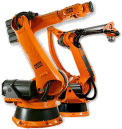Robotic lawn mower
| Part of a series on |
| Automation |
|---|
 |
|
|
| Trade shows |
|
|
| Awards |
|
IEEE Robotics and Automation Award |
| Robots |
|
Industrial robot
|
| General purpose |
|
Home automation
|
| Specific purpose |
|
Automated attendant
|
| Social movements |
|

A robotic lawn mower is an autonomous robot used to cut lawn grass. A typical robotic lawn mower (in particular earlier generation models) requires the user to set up a border wire around the lawn that defines the area to be mowed. The robot uses this wire to locate the boundary of the area to be trimmed and in some cases to locate a recharging dock. Robotic mowers are capable of maintaining up to 30,000 m2 (320,000 sq ft) of grass.
Robotic lawn mowers are increasingly sophisticated, are self-docking and some contain rain sensors if necessary, nearly eliminating human interaction. Robotic lawn mowers represented the second largest category of domestic robots used by the end of 2005.
In 2012, the growth of robotic lawn mower sales was 15 times that of the traditional styles.[1] With the emergence of smart phones some robotic mowers have integrated features within custom apps to adjust settings or scheduled mowing times and frequency, as well as manually control the mower with a digital joystick.[2]
Modern robotic lawn mowers can contain specialized sensors, allowing them to automatically mow around obstacles or even go to sleep when it starts to rain.[3][4]
The vast majority of robotic lawn mowers tackle the task utilizing a "random" mowing system. Basically the machine bounces around on the lawn until it hits the boundary wire limiting the working area, then changes heading until it hits the wire again.[5] Depending on the lawn size, this might take a very long time, so the machine must more or less be in continuous operations. One exception is the Bosch robotic lawn mower "Indego" which creates a map of the users garden and then tackles the task in a systematic manner.[6]
History[]
In 1969, the MowBot is introduced and patented by S Lawrence Bellinger and already showing many features of today's most popular products. It weighted 125 pounds (57 kg), was selling for $800 ($5600 in 2020 dollars[7]) and had an autonomy of 3 hours and 3,000 square feet (280 m2)[8][9][10][11]
In 1992, the first fully solar powered robotic mower is patented by André Collens and sold to Husqvarna which markets it in 1995.[12][13][14][15]
In 2012, the Bosch Indego introduced lawn mapping, to mow in a systematic manner instead of a random pattern.[6]
As of 2019, vision-based robotic mowers, without perimeter wire, were announced.[16][17]
In 2020, Husqvarna announced a new robotic mower (EPOS) that can navigate completely without boundary wire, allowing location accuracy of 2-3 centimeters by using satellite navigation on a reference station.[18]
Technology[]
The mower can find its charging station via radio frequency emissions, by following a boundary wire, or by following an optional guide wire. This can eliminate wear patterns in the lawn caused by the mower only being able to follow one wire back to the station.
To get to remote areas or areas only accessible through narrow passages the mower can follow a guide wire or a boundary wire out of the station.
Batteries used include nickel–metal hydride (NiMH), lithium-ion and lead-acid.
In 2019 an all-wheel-drive (AWD) drive robotic mower was released by Husqvarna.[19]
Examples[]
See also[]
- Domestic robots
- Lawn mower
- List of home automation topics
- Robotics
- Modern conveniences
References[]
- ^ "Rise of the Lawn-Cutting Machines". 2012-10-25. Retrieved 2012-11-15.
- ^ "Robomow RS630 Review". Best Stuff. 2014-05-09. Archived from the original on 2014-05-11. Retrieved 2014-05-10. Alt URL
- ^ Oswald, Ed (April 12, 2020). "The best robotic lawn mowers for 2020". Digital Trends. Retrieved 2020-05-19.
- ^ "Best Robotic Lawn Mower Guide". Robotic Reviews. 2018-01-21. Archived from the original on 2018-01-21. Retrieved 2018-01-21.
- ^ "Rasenroboter Test". Bautomatik (in German). 11 November 2020. Retrieved 2020-11-11.
- ^ Jump up to: a b "Bosch Introduces New Autonomous Robotic Lawnmower". IEEE Spectrum: Technology, Engineering, and Science News. Retrieved 2020-06-09.
- ^ "$800 in 1969 → 2020 | Inflation Calculator". www.in2013dollars.com. Retrieved 2020-06-09.
- ^ "Self-propelled random motion lawnmower". 1969-10-20. Retrieved 2013-06-08. U.S. Patent 3,698,523
- ^ "MowBot (Jan, 1969)". 2011-10-14. Retrieved 2013-06-08.
- ^ Corporation, Bonnier (January 1969). Popular Science. Bonnier Corporation. pp. 136–138, 210.
- ^ Magazines, Hearst (December 1968). Popular Mechanics. Hearst Magazines. p. 83.
- ^ "BE1004248A6 SYSTEME DE TONTE CONTINUE ET AUTONOME". worldwide.espacenet.com. Retrieved 2020-06-09.
- ^ "Les inventeurs bruxellois crient "Eurêka!" Le courant magique de M. Deiana La pince à moules qui laisse les doigts nets Mode d'emploi du 47 e Salon". Le Soir (in French). Retrieved 2020-06-09.
- ^ "Un objet tondant identifié". www.dhnet.be (in French). 2002-05-17. Retrieved 2020-06-09.
- ^ "25 robotic anniversary". Husqvarna (in French). Retrieved 2020-06-09.
- ^ Damme, Dries Van (2017-10-31). "Ce robot tond l'herbe, arrache les mauvaises herbes et ramasse les petites branches". Site-DataNews-FR. Archived from the original on 2020-05-19. Retrieved 2020-05-10.
- ^ "Volta Mora Robot Mower – The Future Of Robot Lawnmowers". MyRobotMower. Retrieved 2 April 2020.
- ^ "How new technology is improving robotic mowers". www.hortweek.com. Retrieved 2021-04-18.
- ^ Steele, Billy. "Hills can't stop this all-wheel-drive robot lawn mower". engadget. Retrieved 6 June 2019.
External links[]
 Media related to Robotic lawn mowers at Wikimedia Commons
Media related to Robotic lawn mowers at Wikimedia Commons
- Lawn mowers
- Domestic robots
- Technology in society
- 20th-century inventions





